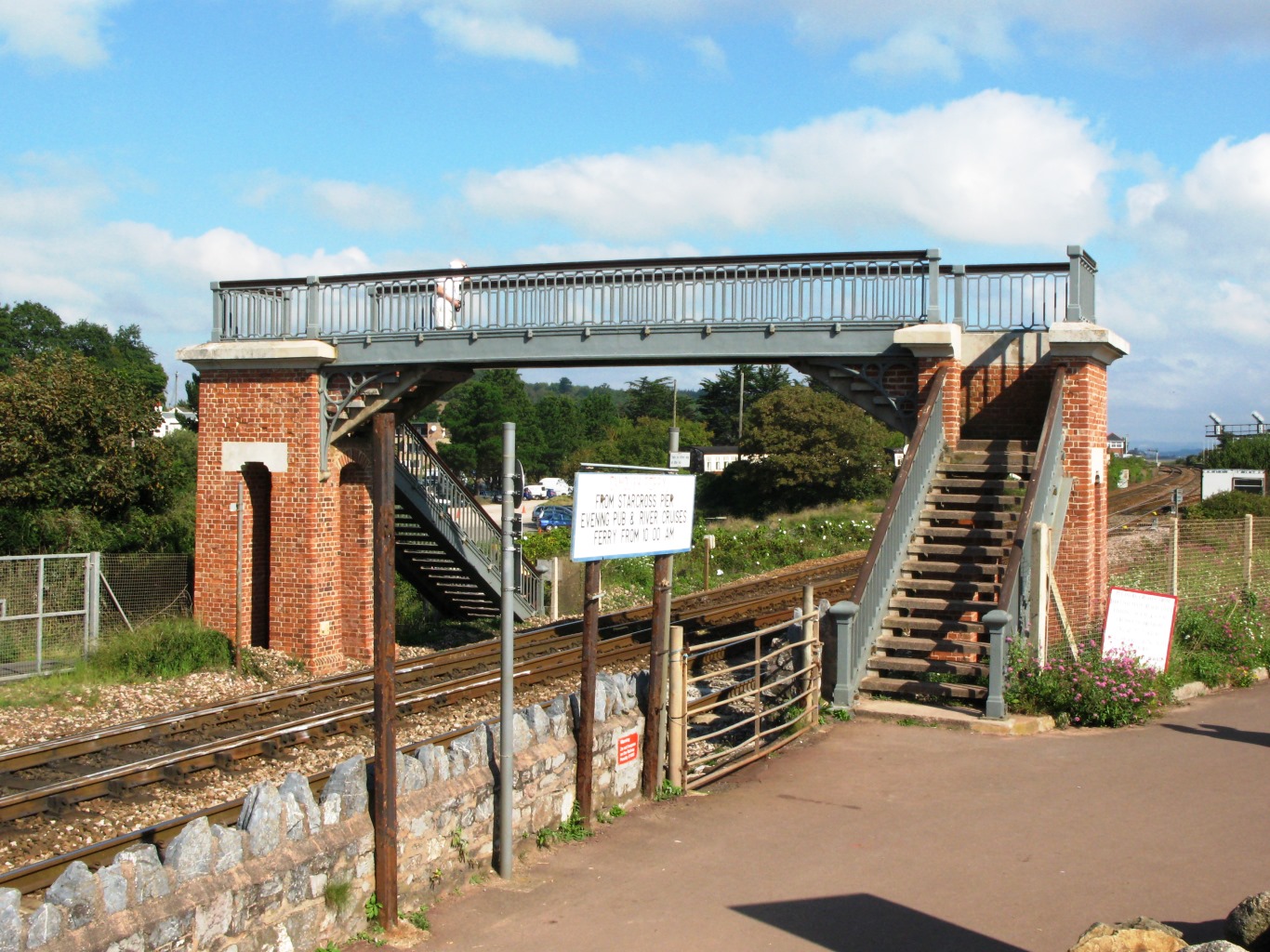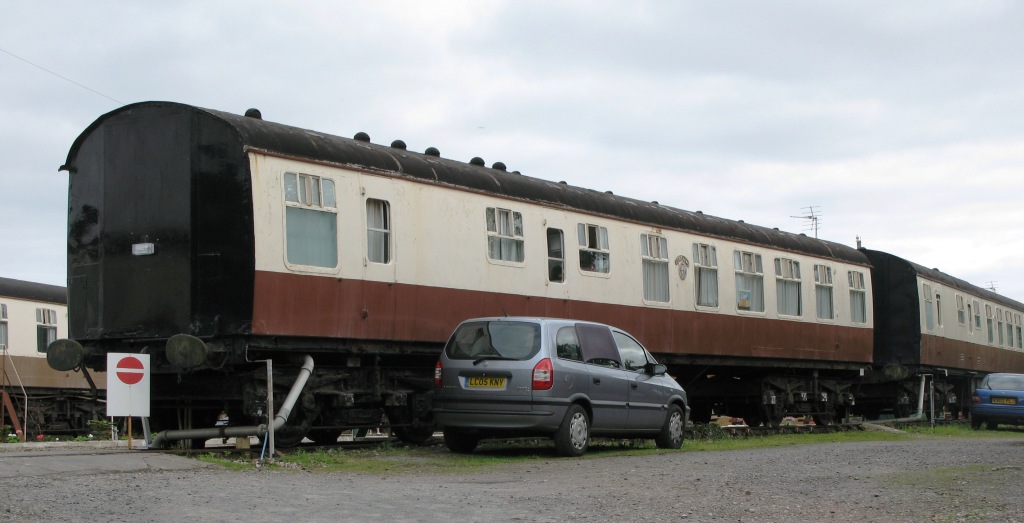Dawlish Warren railway station on:
[Wikipedia]
[Google]
[Amazon]
Dawlish Warren railway station serves the
 No station was provided between and until the summer of 1905 when Warren Halt was opened by the
No station was provided between and until the summer of 1905 when Warren Halt was opened by the  In 1935 a camp coach was stationed in the goods yard which could be rented by holiday makers but the facility was withdrawn in 1939. Camping coaches were reintroduced by the Western Region in 1952, and by 1963 there were nine coaches stationed here. After 1964 the public camp coach service was withdrawn but the coaches at Dawlish Warren continued to be managed by the British Rail Staff Association for its members. The old coaches were replaced for the 1982 season by the current vehicles, since when the connection to the goods yard has been removed.
The
In 1935 a camp coach was stationed in the goods yard which could be rented by holiday makers but the facility was withdrawn in 1939. Camping coaches were reintroduced by the Western Region in 1952, and by 1963 there were nine coaches stationed here. After 1964 the public camp coach service was withdrawn but the coaches at Dawlish Warren continued to be managed by the British Rail Staff Association for its members. The old coaches were replaced for the 1982 season by the current vehicles, since when the connection to the goods yard has been removed.
The

 Dawlish Warren is served by
Dawlish Warren is served by
Dawlish Warren camping coaches
{{Devon railway stations Railway stations in Devon Railway stations in Great Britain opened in 1912 Railway stations in Great Britain closed in 1917 Railway stations in Great Britain opened in 1919 Former Great Western Railway stations Railway stations served by Great Western Railway 1912 establishments in England Dawlish DfT Category F2 stations
seaside resort
A seaside resort is a town, village, or hotel that serves as a vacation resort and is located on a coast. Sometimes the concept includes an aspect of official accreditation based on the satisfaction of certain requirements, such as in the Germa ...
and holiday camps of Dawlish Warren
Dawlish Warren is a seaside resort near the town of Dawlish in Teignbridge on the south coast of Devon in England. Dawlish Warren consists almost entirely of holiday accommodation and facilities for holiday-makers especially caravan sites.
Lo ...
in Devon
Devon ( , historically known as Devonshire , ) is a ceremonial and non-metropolitan county in South West England. The most populous settlement in Devon is the city of Plymouth, followed by Devon's county town, the city of Exeter. Devo ...
, England
England is a country that is part of the United Kingdom. It shares land borders with Wales to its west and Scotland to its north. The Irish Sea lies northwest and the Celtic Sea to the southwest. It is separated from continental Europe ...
, at the mouth of the River Exe
The River Exe ( ) in England rises at Exe Head, near the village of Simonsbath, on Exmoor in Somerset, from the Bristol Channel coast, but flows more or less directly due south, so that most of its length lies in Devon. It flows for 60 mile ...
. The station is on the Exeter to Plymouth line, down the line from and measured from via .
From here to Teignmouth, the railway runs along the sea wall
A seawall (or sea wall) is a form of coastal defense constructed where the sea, and associated coastal processes, impact directly upon the landforms of the coast. The purpose of a seawall is to protect areas of human habitation, conservation ...
.
History
Great Western Railway
The Great Western Railway (GWR) was a British railway company that linked London with the southwest, west and West Midlands of England and most of Wales. It was founded in 1833, received its enabling Act of Parliament on 31 August 1835 and ran ...
. This was not on the site of the present station, but nearer to the Sea Wall by the footbridge which had been built across the line in 1873. An iron 'pagoda' waiting shelter was provided on each -long platform. In 1906 the platforms were extended to . From 1 July 1907 the station was staffed and renamed 'Warren Platform. It was provided with a booking office and larger waiting room by adding larger iron buildings alongside the original 'pagodas'.
Work soon started on a new station. A goods yard was opened on 10 June 1912 on the landward side of the line, and the new station, now nearer to Starcross, was opened to passengers on 23 September 1912. The platforms were now long. It had been intended to move the iron buildings from the old platform but instead larger wooden buildings were provided. Between 1 January 1917 and 5 May 1919 the station was temporarily closed due to World War I
World War I (28 July 1914 11 November 1918), often abbreviated as WWI, was List of wars and anthropogenic disasters by death toll, one of the deadliest global conflicts in history. Belligerents included much of Europe, the Russian Empire, ...
. The building on the 'Down' platform (nearest the beach) was destroyed by fire on 9 January 1924.
 In 1935 a camp coach was stationed in the goods yard which could be rented by holiday makers but the facility was withdrawn in 1939. Camping coaches were reintroduced by the Western Region in 1952, and by 1963 there were nine coaches stationed here. After 1964 the public camp coach service was withdrawn but the coaches at Dawlish Warren continued to be managed by the British Rail Staff Association for its members. The old coaches were replaced for the 1982 season by the current vehicles, since when the connection to the goods yard has been removed.
The
In 1935 a camp coach was stationed in the goods yard which could be rented by holiday makers but the facility was withdrawn in 1939. Camping coaches were reintroduced by the Western Region in 1952, and by 1963 there were nine coaches stationed here. After 1964 the public camp coach service was withdrawn but the coaches at Dawlish Warren continued to be managed by the British Rail Staff Association for its members. The old coaches were replaced for the 1982 season by the current vehicles, since when the connection to the goods yard has been removed.
The Great Western Railway
The Great Western Railway (GWR) was a British railway company that linked London with the southwest, west and West Midlands of England and most of Wales. It was founded in 1833, received its enabling Act of Parliament on 31 August 1835 and ran ...
was nationalised
Nationalization (nationalisation in British English) is the process of transforming privately-owned assets into public assets by bringing them under the public ownership of a national government or state. Nationalization usually refers to pri ...
into British Railways
British Railways (BR), which from 1965 traded as British Rail, was a state-owned company that operated most of the overground rail transport in Great Britain from 1948 to 1997. It was formed from the nationalisation of the Big Four British rai ...
on 1 January 1948. Goods traffic was withdrawn on 5 August 1967 and on 3 May 1971 the station became unstaffed. From 1974 to 1984 the buildings on the Up side housed the Dawlish Warren Railway Museum with its model railway. This building too burnt down in 2003, but in 2007 a new residential building was built on the site which is outwardly the same design as the former Dawlish Warren signal box. This had been located at the north end of the 'Down' platform until made redundant on 14 November 1986 by the West of England resignalling; it was demolished in May 1990.
Platform layout
There are four tracks through the station with platforms on the outer pair which allows fast trains to overtake trains stopped at the station. Trains towards use the platform nearest the beach, which is only a few yards away. The station has step-free access to both platforms. A narrow and low bridge beneath the line immediately south of the station allows access between the platforms.Location
Behind the westbound platform is a golf course and thesalt marsh
A salt marsh or saltmarsh, also known as a coastal salt marsh or a tidal marsh, is a coastal ecosystem in the upper coastal intertidal zone between land and open saltwater or brackish water that is regularly flooded by the tides. It is dominated ...
and dune
A dune is a landform composed of wind- or water-driven sand. It typically takes the form of a mound, ridge, or hill. An area with dunes is called a dune system or a dune complex. A large dune complex is called a dune field, while broad, f ...
s that make up the Dawlish Warren
Dawlish Warren is a seaside resort near the town of Dawlish in Teignbridge on the south coast of Devon in England. Dawlish Warren consists almost entirely of holiday accommodation and facilities for holiday-makers especially caravan sites.
Lo ...
National Nature Reserve.
Services

 Dawlish Warren is served by
Dawlish Warren is served by Great Western Railway
The Great Western Railway (GWR) was a British railway company that linked London with the southwest, west and West Midlands of England and most of Wales. It was founded in 1833, received its enabling Act of Parliament on 31 August 1835 and ran ...
trains in both directions on an approximately hourly basis during the day. Most trains on Mondays to Saturdays run between and ; on Sundays, the service is less frequent and most trains only run between and Paignton. The route from Exeter St Davids through Dawlish Warren to Paignton is marketed as the ''Riviera Line
The Riviera Line is the railway between the city of Exeter, towns Dawlish and Teignmouth, and the ''English Riviera'' resorts of Torbay in Devon, England. Its tracks are shared with the Exeter to Plymouth Line along the South Devon sea wall. ...
''.
A few trains run between Bristol
Bristol () is a city, ceremonial county and unitary authority in England. Situated on the River Avon, it is bordered by the ceremonial counties of Gloucestershire to the north and Somerset to the south. Bristol is the most populous city in ...
, and beyond; otherwise, passengers travelling east or north change into main line trains at Exeter St Davids, or at Newton Abbot if travelling westwards. The outside lines can accommodate an eight-carriage Great Western Railway service, but only selected doors are able to open due to the short platform.
On summer Saturdays, there are three direct services from London Paddington
Paddington, also known as London Paddington, is a London station group, Central London railway terminus and London Underground station complex, located on Praed Street in the Paddington area. The site has been the London terminus of services pro ...
to Paignton calling at Dawlish Warren with three return services. On Sundays, there are no services to/from London; passengers to/from London have to change at Exeter St Davids.
References
Further reading
* * *External links
Dawlish Warren camping coaches
{{Devon railway stations Railway stations in Devon Railway stations in Great Britain opened in 1912 Railway stations in Great Britain closed in 1917 Railway stations in Great Britain opened in 1919 Former Great Western Railway stations Railway stations served by Great Western Railway 1912 establishments in England Dawlish DfT Category F2 stations